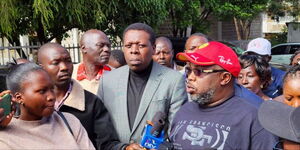A recent report has revealed that politicians during the August 2017 electioneering period bought information from rogue officials of the Independent Electoral and Boundaries Commission (IEBC) to target voters with their campaign messages.
The document published by Strathmore University Centre for Intellectual Property and Information Technology Law (CIPIT) found that a vast majority of campaign messages sent to voters during the 2017 election period were unsolicited.
Furthermore, the study found that a majority of voters did not provide politicians with their phone numbers as part of a political message subscription service or for any other related purpose.
"However, that It is also evident that different IEBC personnel have access to the biometric voter register at constituency, county, and national levels. Only the IEBC has voter registration data, which was included in the messages that we collected in the survey.
[caption caption="A sample of the unsolicited messages votes received"] [/caption]
[/caption]
"It is possible that political aspirants were able to obtain this data from the rogue officials at the Commission. More mechanisms that are stringent are therefore necessary regarding access to the biometric voter register," the report titled Biometric Technology, Elections, And Privacy in Kenya reads in part.
99% of the 228 respondents in the study had not subscribed to any political messaging service, yet received unsolicited political campaign messages.
In the study, the politicians who sent the most unsolicited messages were Members of Parliament (MPs), Members of County Assembly (MCAs) and Governor aspirants.
"The key takeaway is that Kenya’s legal landscape lacks the protections needed to safeguard the privacy of its citizens and protect their data. Transparency, trust, and security are key when deploying biometrics technologies.
"When such technologies are adopted in the absence of a strong legal framework and strict safeguards, they pose significant threats to privacy and personal security, as their application can be broadened to facilitate discrimination, social sorting and mass surveillance.
"The varying accuracy of the technology can lead to misidentification, fraud and civic exclusion. As such, it is crucial that as Kenya reviews its election and referenda processes, the use of biometric technologies be understood from a privacy and security perspective," the report reads.
[caption caption="The politicians who sent the messages"] [/caption]
[/caption]












